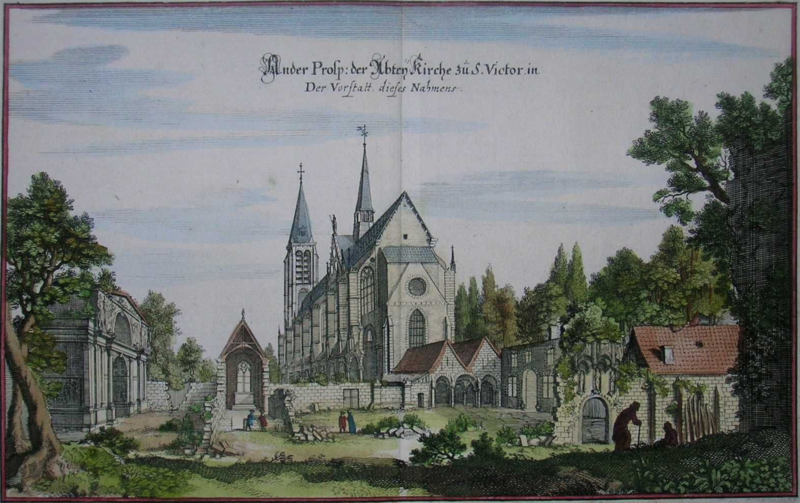Call for Abstracts: The Parisian School of Saint-Victor in the Middle Ages: A European-wide Thought

The Parisian School of Saint-Victor in the Middle Ages:
A European-wide Thought
Due to the current sanitary situation the previously announced conference will not take place. We are, however, committed to the exchange of ideas, and thus we are still going to publish a book in Bibliotheca Victorina series in Brepols. The book is aimed to be a collection of articles focusing on the Parisian school of Saint Victor and its doctrinal contribution to a widely construed common European culture (see more below).
Call for abstracts and papers
The preparation of the book will consist in two steps:
1. We kindly ask to send us the title and the abstract of your paper before 10thJune. The abstract should have about 2000 signs. The aim of this step is not selection. It will allow the editors to have the idea of the number of papers, the range of subjects etc. Moreover, if the editors realise that the proposed text raises big difficulties, they will be able to contact the author.
2. We kindly ask to send us the complete papers by the end of September. Those, after a reviewing procedure, will be published in the book. The papers should be about 40 000 signs long. The following languages are accepted: English, French, German, Italian, Spanish, with preference to English and French.
Founded at the beginning of the twelfth century on the outskirts of Paris, the Parisian school of Saint-Victor soon became an intellectual centre on a European scale: through the international recruitment of its masters: Hugh, Achard, Richard, Andrew, Godfrey, Thomas Gallus, and many others; through the wide handwritten dissemination of their works, in particular those of Hugh and Richard; and finally through the extent of its doctrinal contribution to a common European culture, on a large number of points:
a) The importance of acquiring, before specializing, a «general culture» according to an encyclopaedic curriculum rooted in classical and patristic traditions;
b) The need for a rigorous historical approach to biblical texts, open to rabbinic exegesis, before moving on to their allegorical or moral interpretation;
c) A contagious interest in the writings and thought, hitherto largely neglected, of the pseudo-Dionysius the Areopagite;
d) A major contribution to the constitution of a theological discipline, distinct from both exegesis and philosophy;
e) An effort to reconcile rigour in doctrinal speculation, fervour in spiritual life, and psychological finesse in the analysis of contemplation and its stages.
In short, a curiosity about all fields of knowledge and, at the same time, an effort to unify them into a universal and unified wisdom explains the role, direct or indirect, played by the masters of Saint-Victor in the constitution of a common European thought, at the time of medieval universities and beyond.
Scholarly Committee
Giulio D’Onofrio (Università degli Studi di Salerno)
Fr. Hugh Feiss OSB (Monastery of the Ascension, Jerome, Idaho)
Cédric Giraud (Université de Lorraine, Université de Genève)
Ruedi Imbach (Université de Fribourg, Université de Paris – Sorbonne)
Paul Rorem (Union Theological Seminary, New York)
P. Patrice Sicard SVict (École Cathédrale de Paris, Collège des Bernardins)
Organising Board
Wanda Bajor (KUL JPII)
Agnieszka Kijewska (KUL JPII)
Dominique Poirel (IRHT/CNRS, KUL JPII)
Michał Buraczewski
Marcin Janecki
Keynote speakers
Alexander Baumgarten (Universitatea Babeș-Bolyai, Cluj-Napoca)
Montse Leyra Curiá (Universidad San Dámaso, Madrid)
Giulio D’Onofrio (Università degli Studi di Salerno)
Cédric Giraud (Université de Lorraine, Université de Genève)
Ruedi Imbach (Université de Fribourg, Université de Paris – Sorbonne)
CALL FOR PAPERS
We invite speakers interested in the topic to contact the secretary of the conference:
Michał Buraczewski, MA: michal.buraczewski@gmail.com
or Marcin Janecki, MA: janecki@usal.es
or Agnieszka Kijewska: agnieszka.kijewska@kul.pl
or Dominique Poirel: dominique.m.c.poirel@gmail.com
featured image author: Gravure de Merian
source: wikipedia
license: public domain